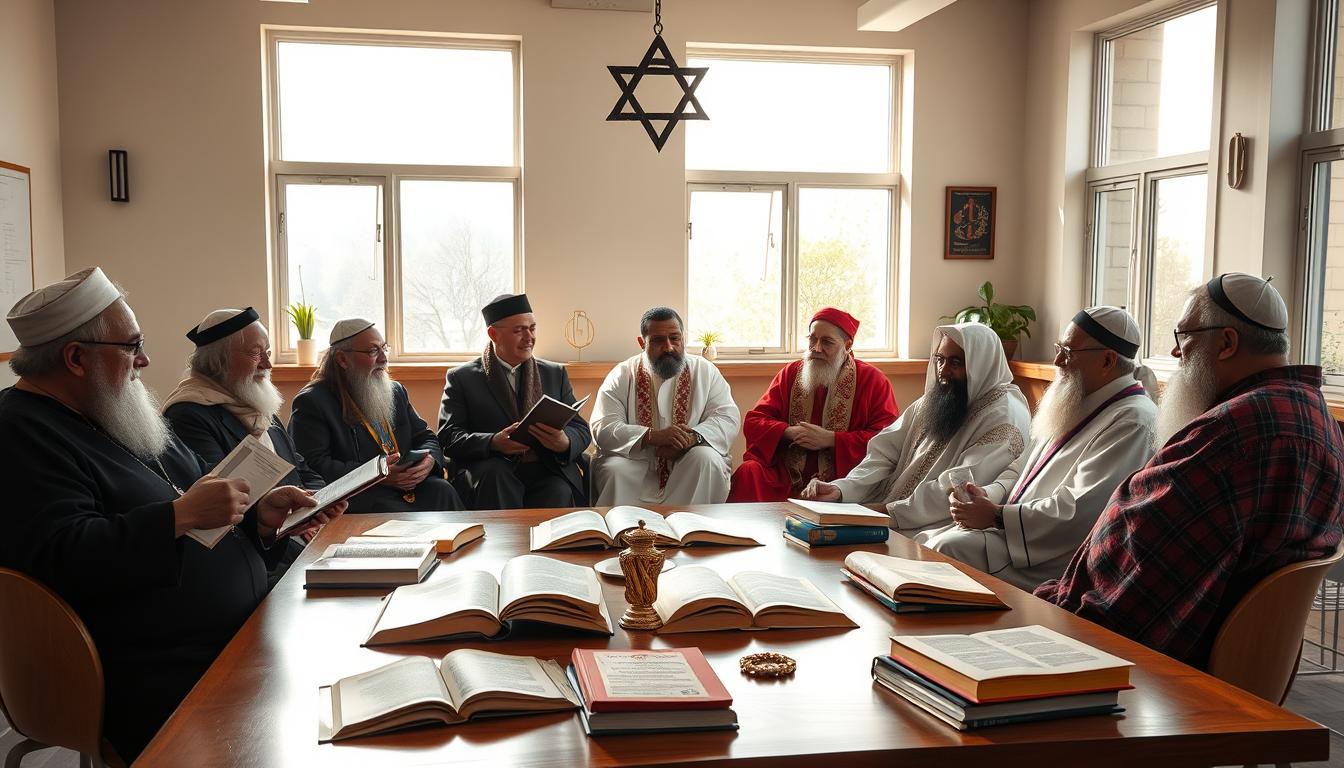Exploring the various worldviews of religions is captivating. There are over 2 billion Christians in the world. In Brazil, there are approximately 167 million, according to the 2010 Census. Christianity is just one of the areas of study.
Adverts
You courses on comparative religions seek to satisfy this desire to understand different beliefs. This helps not only to understand one's own faith, but also that of others. This is a way to achieve a spiritual expansion. In Brazil, religious diversity is great. And the study of these religions is important for peaceful coexistence in a diverse society.
The number of Catholics has been declining, while the number of Protestants has been increasing. Nevertheless, interest in spirituality in various forms continues to grow. This shows the need for dialogue and understanding between different faiths.
Introduction to the study of comparative religions
The diversity of beliefs around the world is immense. The comparison of beliefs has become a crucial tool for deepen spiritual knowledge. Comparative religion allows us to explore the connections between different practices, noting both similarities and differences.
What is comparative religion: an overview
Comparative religion seeks to understand and analyze religions broadly. It respects the uniqueness of each faith and promotes interreligious dialogue. This contributes to a more tolerant and well-informed society.
The historical evolution of the comparative study between religions
In the 19th century, the study of religions gained momentum. It was a time of great cultural change and scientific advances. Scholars began to view the sacred from a scientific and academic perspective, bringing new ways of understanding faith.
The relevance of interreligious studies in contemporary society
In today's era of global interactions, the role of this study is vital. It helps to reduce misunderstandings and promotes peace between diverse groups. It is essential for mutual respect and understanding between cultures, contributing to social cohesion and world peace.
Methodology and the plurality of approaches in comparative religions
Exploring the diversity of religions and their complexities is an interesting challenge. Courses in study of religions comparatives give us a broad view. They allow a interfaith learning respectful.
To be successful, it is essential to analyze religions systematically. Simplifications should be avoided. The analysis considers scriptures, rituals, ethics and social aspects of each belief.
Practices and Doctrines: How They Compare Between Different Religions
Interfaith study helps us understand fundamental beliefs and practices. It looks for patterns and important differences. It does this with the understanding that each religion has a unique context.
Public theology and the interpretation of sacred spaces
In the field of public theology, conversations about religious diversity take on a civic aspect. The analysis of sacred spaces and the role of faith in society help to understand the coexistence of religions.
Delimitations and challenges in comparing beliefs
When comparing religions, it is essential to maintain a balance. This respects the differences between spiritual practices and experiences. This way, the dialogue between different beliefs becomes rich and informative.
Courses on comparative religions can expand your spiritual knowledge
The search for spiritual knowledge has grown a lot. This is because of globalization. Now, more than ever, we need to understand and respect different beliefs.
You courses on comparative religions are very important in this sense. They help us to study religions in a respectful way. This strengthens mutual respect between different faiths.
The word “hierophany” shows how the sacred appears in religions. It is essential to promote tolerance. Thus, these studies help us to better understand spirituality.
Being spiritual provides emotional support, especially when someone is sick. Understanding different beliefs about life and death provides comfort. This helps to improve mental and physical health.
Studying different beliefs also brings benefits to the workplace. The integration of spirituality into the workplace is called “spiritual capital.” This motivates employees, improving productivity and well-being.
So, do courses on comparative religions helps us grow spiritually. It also makes our society recognize and value religious diversity.
Points of contact and divergence between the great monotheistic religions
Judaism, Christianity and Islam have both similarities and similarities. These differences and similarities are important for understanding global spirituality. Although they all believe in one God, they differ in many doctrines and traditions.
In the comparison of beliefs, we see that each religion values its scriptures. However, interpretations and historical contexts create distinct practices. These differences directly affect the culture of their followers. Understanding these variations helps in respect and peaceful coexistence between communities.
God and the Scriptures: Judaism, Christianity and Islam
Judaism, Christianity and Islam worship one supreme god. But they see and understand God in different ways. The idea of the trinity, for example, does not exist in Judaism and Islam. They emphasize that God is absolutely one.
Moral and theological aspects and their cultural influences
These religions influence the beliefs and moral systems of their societies. For example, Sharia law greatly affects daily life in Islamic countries. Christian ethics have played a large role in modern Western thought.
The concept of salvation and life after death
The idea of salvation is central to these religions. Each has a different view of the afterlife. This influences how its followers live. Christianity speaks of salvation through faith in Jesus. Judaism focuses on actions in the present world. Islam combines faith and actions in the search for salvation.
Studying these similarities and differences helps us better understand spiritual traditions. It also promotes tolerance and understanding between different cultures.
Comparing religions from different backgrounds: Buddhism and Christianity
The analysis of the Buddhism and of the Christianity shows important differences in their beliefs and practices. Both religions talk about ethics, values and human life. However, they have different views on central themes.
At the Christianity, believing in one God is essential. Already in Buddhism, the idea is to achieve enlightenment without a creator. This view influences how its followers view suffering and the search for transcendence.
One similarity between them is the use of meditation, but for different purposes. For Christians, meditation is a way to connect with God. Buddhists meditate seeking mental clarity and reaching nirvana.
Studying these two traditions increases our spiritual knowledge. It helps to understand how different cultures view faith and the meaning of life. The Science of Religion, supported by Capes, continues to deepen these studies, promoting respectful inter-religious dialogue.
Contemporary Dialogues: Spiritism and other religious practices in Brazil
Practices such as Spiritism, coming from the ideas of Allan Kardec, are notable in Brazil. They stand out for their history and their connection with other faiths. religious plurality of Brazil is shown in various beliefs and practices, reflecting the nation's rich culture.
A transcendental meditation, inspired by the East, found a place in Brazil. Here, it joins with local beliefs. This union shows how good Brazil is at welcoming and adapting ideas from abroad, while respecting its own way of being. This enriches our religious plurality and helps in dialogue between different cultures.
The Spiritist Doctrine and Brazilian Religious Diversity
O Spiritism It is followed by about 4.6% of Brazilians, studies show. It defends love, charity and good conduct, promoting tolerance and respect between different beliefs. This doctrine is an important part of our religious identity, linked to the culture and society of Brazil.
The influence of Eastern religious thought on transcendental meditation
A transcendental meditation brings Eastern thoughts to Brazil. It goes beyond religion, seeking self-knowledge and well-being. By finding space in the various religions of Brazil, this practice highlights our capacity to change and grow spiritually.
Religion and identity: the role of faith in everyday life
In Brazil, faith is more than following a religion; it influences our daily lives. Observing practices such as Spiritism and the transcendental meditation, we see how spirituality is essential. It helps to form our identity and unites us as a society.
Conclusion
Studying comparative religions helps us better understand the relationship between faith and well-being. Many fields, such as nursing and medicine, already recognize the importance of spirituality. However, spirituality is still rarely included in academic curricula. This is seen in courses such as dentistry and psychology.
These courses attempt to fill this gap by offering a path to understanding faith and health. Studies show that people who are more religious or spiritual often live better lives. This connection is proven by tools such as the WHOQOL-100 and EBE. spiritual knowledge benefits both the individual and the health treatment as a whole.
In Brazil, there are a large number of religious temples, even more than schools or hospitals. This shows that we have a large field for research and development in this area. Therefore, courses on comparative religions are essential. They help to build a more united society that respects the diversity of beliefs.




